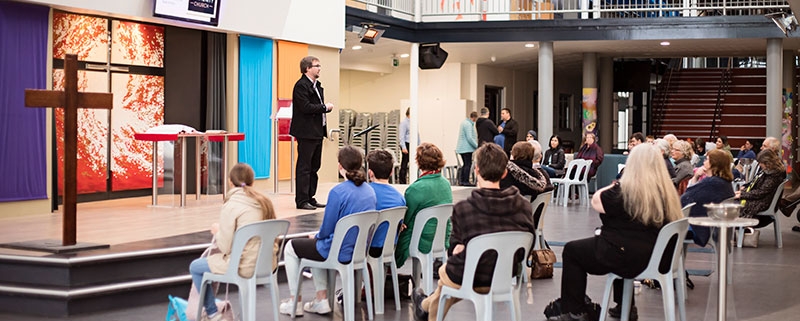by Lisa McIntosh
While the tragedies caused by the COVID-19 pandemic have upended many lives, ‘getting back to normal’ is not something the people of Mawson Lakes Community Church (MLCC) are hoping for.
Like many other church communities, the people of this LCA/NZ congregation in Adelaide’s north have undergone some dramatic shifts in their ministries since March this year. But for MLCC it wasn’t just a case of temporarily ‘pivoting and innovating’ while churches were closed – instead it’s been a matter of ushering in sustainable change.
For Pastor Chris Mann that attitude is biblically based.
‘Every time there’s a crisis, what God wants people to do is to embrace something new – you find that all through the Bible’, he says. ‘And so when people say they want to go back to the way things were, I find that sad and disheartening. They’re missing what God has for them.
‘We’re wired by God for new things, especially in hard times. So the question really is, “What is the ‘new’ that God would have us do during this time?” Newness gives the direction, hope and structure to people that they desperately need in hard times. So we want to keep on going and see where God would take this.’
Before COVID-19, MLCC had an out-of-date website and little social media presence. When shutdown occurred, decisions were made to employ staff to improve and increase the church’s online presence, including through its website at www.mlcc.org.au
Creating an online community using live-streaming – a focus even after face-to-face worship returned in South Australia – has enabled the congregation to support those unable to meet in person, says Amy Dahlenburg, who oversees the communication of church culture through branding, online presence and community connection. She says the congregation has utilised online social media platforms Facebook and Instagram, as well as making weekly community calls through internet conferencing system Zoom and sending out newsletters.
Today MLCC describes itself as ‘one church, two rooms’ – one virtual, online room and one face-to-face room on Sundays.
Pastor Chris says the most important thing MLCC has learnt as a community through the pandemic is to be as inclusive as possible. ‘We’re serving people with online church who always needed to be served, but would only be included through people visiting them in their homes when they were able to’, he says. ‘Now they’re part of the worship service and they feel included. They were always important, but now they feel that they are.’
Having connected with people interstate and overseas through online worship, MLCC is working on improving its ability to follow up those connections. And Pastor Chris says some people who first connected through online worship have started coming to in-person worship once that was available. ‘We’re probably at around about half-a-dozen people who have started coming face-to-face, who we didn’t have contact with before COVID.’
Those without internet access haven’t been forgotten. Amy says MLCC has had church members on a phone cycle to make regular calls to anyone who wasn’t online. Most of these connections were through the church’s small groups.
‘We also encouraged members, when it was safe to do so, to invite people to their houses to watch the live-stream’, Amy says. ‘We still encourage this to help people who are still unable to come to face-to-face church and don’t have internet access, but who may be able to get to a friend’s house or have someone bring a device and sit with them.’
As the congregation’s shepherd, Pastor Chris says his biggest personal learning has been around the capacity of other leaders. ‘We’ve always had an emphasis on “team”, but relying on the expertise of other people and developing a real team ethos among all the leaders, that’s really increased for me as a pastor.’
They’ve also gained new volunteers, some of whom weren’t previously regular worshippers, even though they were part of the MLCC community.
‘People have become motivated, but also their skills have become more valued’, Pastor Chris says. ‘Every church community has people who love that community but don’t come most Sunday mornings. They may just feel there’s not a role for them. We have people who weren’t regular worshippers but have been volunteering regularly, because they care about the church and they care about the people in it.
‘We have a fundamental belief that God has already given us the gifts that we need to do what he wants us to do, so we’ve asked ourselves “Who are the people who’ve got the abilities we need?”.’



